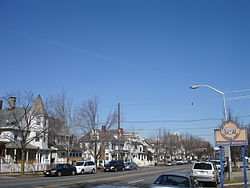The Livingston Avenue Historic District is a 32-acre (13 ha) historic district located along Livingston Avenue between Hale and Morris Streets in the city of New Brunswick in Middlesex County, New Jersey, United States. The district was added to the National Register of Historic Places on February 16, 1996, for its significance in architecture, social history, and urban history from 1870 to 1929.[1] It has 58 contributing buildings and 2 contributing sites, including the Willow Grove Cemetery, the Henry Guest House, and the New Brunswick Free Public Library. The John B. Drury House was built around 1888.[3][4]
Livingston Avenue Historic District | |
 | |
| Location | Area surrounding Livingston Avenue between Hale and Morris Streets New Brunswick, New Jersey |
|---|---|
| Coordinates | 40°29′21″N 74°26′53″W / 40.489167°N 74.448056°W |
| Area | 32 acres (13 ha) |
| Architect | Louis H. Giele; George K. Parsell |
| Architectural style | Queen Anne, Colonial Revival, Classical Revival |
| NRHP reference No. | 96000072[1] |
| NJRHP No. | 3307[2] |
| Significant dates | |
| Added to NRHP | February 16, 1996 |
| Designated NJRHP | December 8, 1995 |
Gallery
edit-
John B. Drury House, Victorian style
-
Roosevelt Intermediate School, Neo-Classical Revival style
-
Ukrainian Catholic Church, Richardsonian Romanesque style
See also
editReferences
edit- ^ a b "National Register Information System – (#96000072)". National Register of Historic Places. National Park Service. November 2, 2013.
- ^ "New Jersey and National Registers of Historic Places - Middlesex County" (PDF). New Jersey Department of Environmental Protection - Historic Preservation Office. December 28, 2020. p. 7.
- ^ Brown, Marvin A. (December 6, 1994). "National Register of Historic Places Inventory/Nomination: Livingston Avenue Historic District". National Park Service. With accompanying 22 photos
- ^ Regan, Timothy E. (2003), New Brunswick, Arcadia Publishing, ISBN 9780738512860
External links
edit- Media related to Livingston Avenue Historic District at Wikimedia Commons


